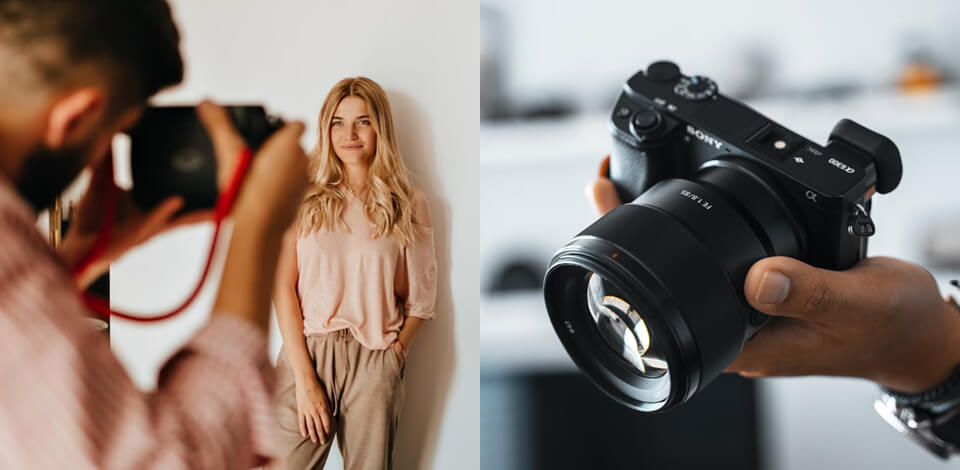
If you are looking for the best portrait camera, you might need to narrow down the available options to a manageable list. Whether you are a professional portrait photographer or a beginner, you need a reliable camera with a set of necessary specs, like ergonomic, MP quality and portability.
On this list, you will find only efficient cameras that are perfect for anyone interested in portrait photography. Here, you will see both budget options for $600 and high-end models with their prices reaching $3,000.









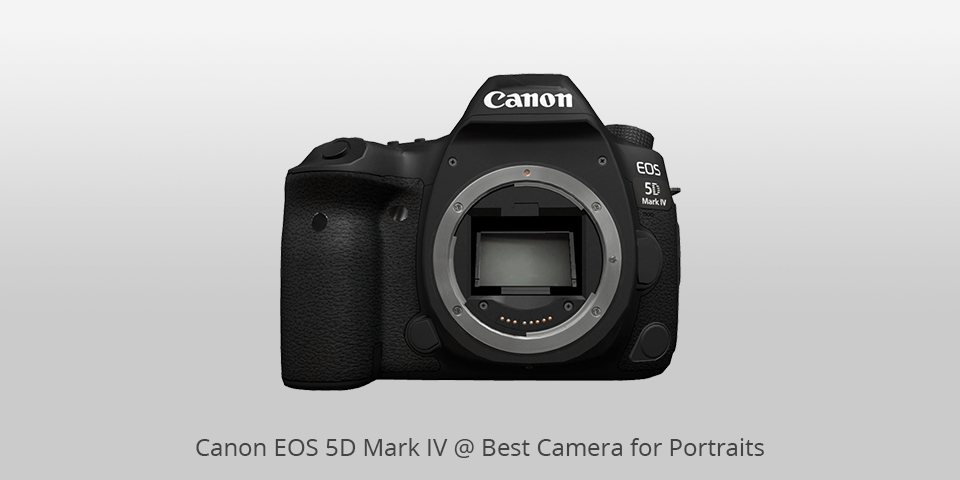
Body type: DSLR | Sensor: 30.4 MP full-frame CMOS sensor | Lens mount: EF Mount | Max resolution: 6720 × 4480
This is one of the best options among other Canon cameras. While this model is pretty expensive, it has an innovative Dual Pixel Raw mode that enables photographers to slightly adjust the focus after taking a photo as well as further enhance bokeh and minimize ghosting, which is very useful when shooting portraits.
This camera is perfectly suitable for portrait photographers who specialize in bokeh photography. It supports a speedy Wi-Fi connection, which enables you to quickly copy photos to your desktop or mobile device. Thanks to the Canon Camera Connect app, you can take photos remotely in real time.
Photo taken with Canon EOS 5D Mark IV
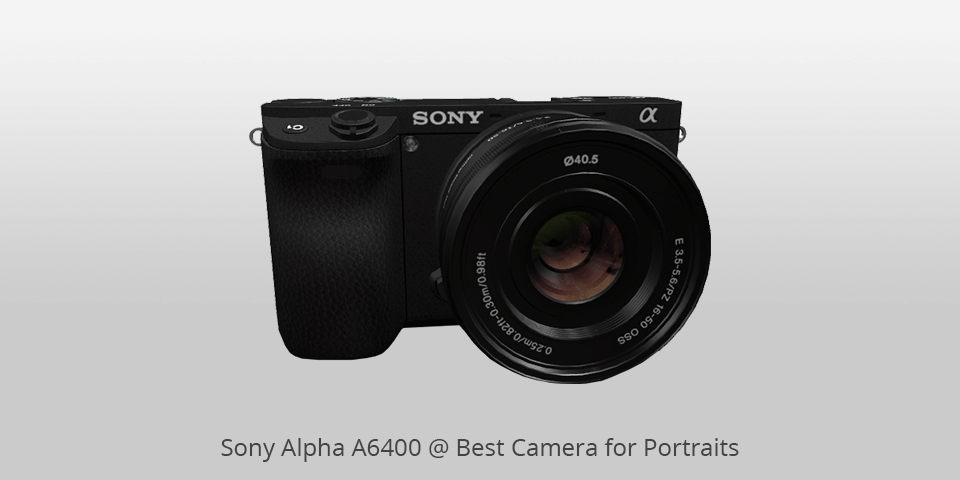
Body type: Mirrorless | Sensor: 24.2 megapixel APS-C Exmor CMOS sensor | Lens mount: E-Mount | Max resolution: 4K/30p
This Sony camera comes with an impressive choice of specs, which makes it a great value for the money. The key advantage of this camera for portraits is that it supports precise AF tracking.
It is pretty portable, which makes it a great choice for travelers. Besides, you can use it with a variety of Sony lenses and accessories.
Its AI-based Real-time Eye AF quickly detects and tracks eye data, which allows the camera to quickly focus on the subject. The LCD monitor supports a range of touch commands for fast focusing and effortless shooting. Thanks to impressive image quality, fast AF, portable body, and a budget price, this model can be considered a great camera for amateur photographer.
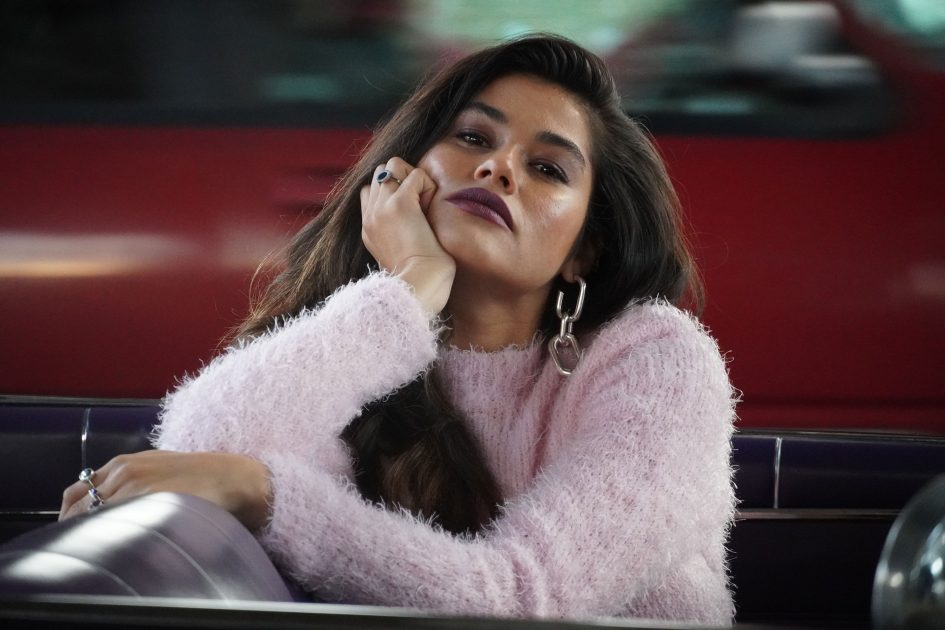
Photo taken with Sony Alpha A6400
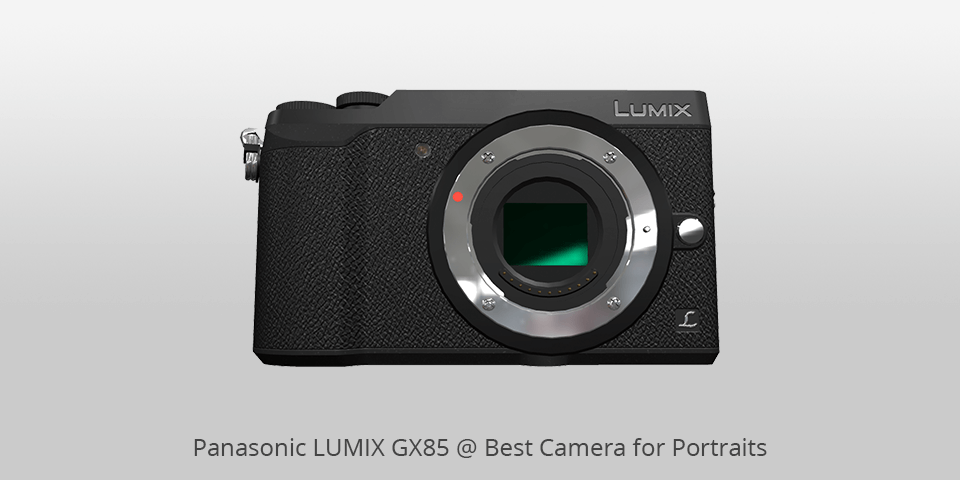
Body type: Micro Four Thirds | Sensor: 16MP Live MOS | Lens mount: Micro Four Thirds Lens Mount | Max resolution: 4592 x 3448
If you are on a tight budget, take a look at this cheap camera which combines impressive quality, advanced features, and high speed. Besides being quite portable and durable, it comes with a range of pro-level features that are rare for devices at this price range.
With this Panasonic camera, you can take crisp and clear portrait images, which makes it similar to other 16MP micro four-thirds cameras. In addition, it allows you to shoot videos at 4K. All in all, this model with an interchangeable lens system is a great choice for beginner photographers.

Photo taken with Panasonic LUMIX GX85
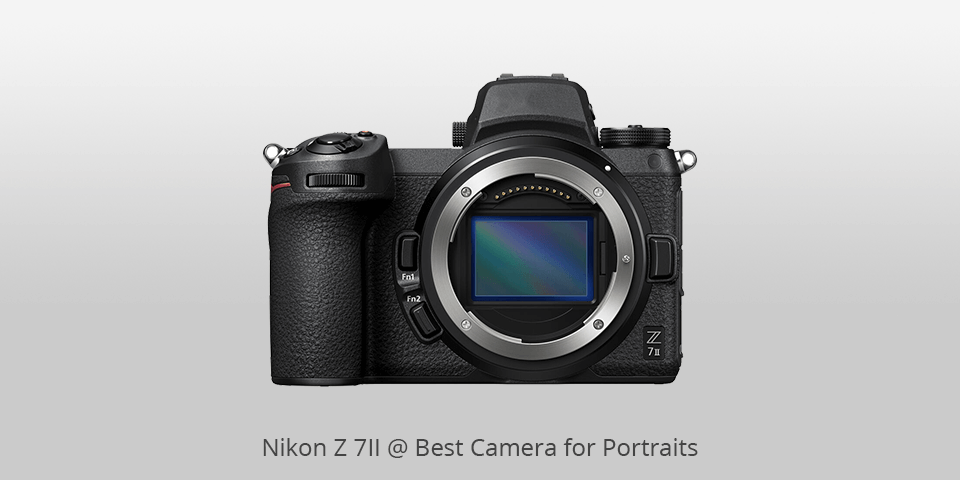
Body type: Mirrorless | Sensor: CMOS full frame (35.9 x 23.9 mm) | Lens mount: Nikon Z mount | Max resolution: 45.7 megapixels
If you're looking for the best camera for portrait photography with top-notch image quality, dynamic range, and speed, the Nikon Z 7II delivers. It boasts an ultra-high resolution sensor with no optical low pass filter, along with the power of dual processors.
You can also shoot 4K Ultra HD video at 60p, which is fantastic. Another advantage is the camera's rugged build. It's dust and drip-resistant, making it a solid choice for outdoor or unpredictable shooting conditions.
One standout feature is its next-generation 493-point autofocus system. This is a big advantage for portrait photographers shooting people in action. It can focus on the subject even when there are other moving subjects around, ensuring you capture those crucial moments. Additionally, the camera has two card slots, flexible power options, and a vertical battery grip, which is great for longer shoots.
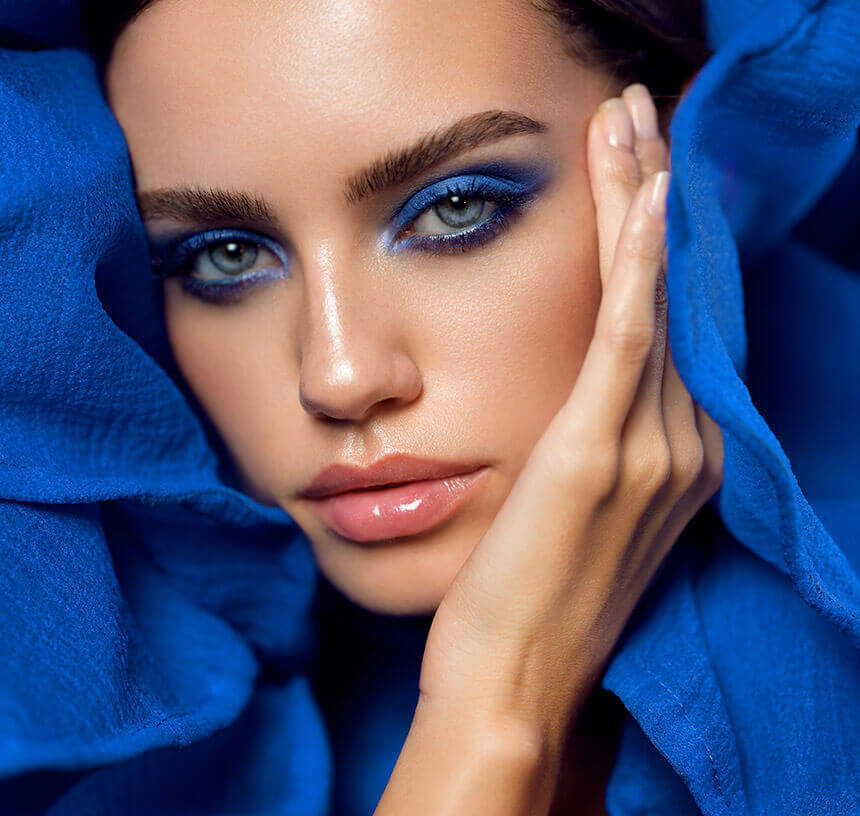
Photo taken with Nikon Z 7II
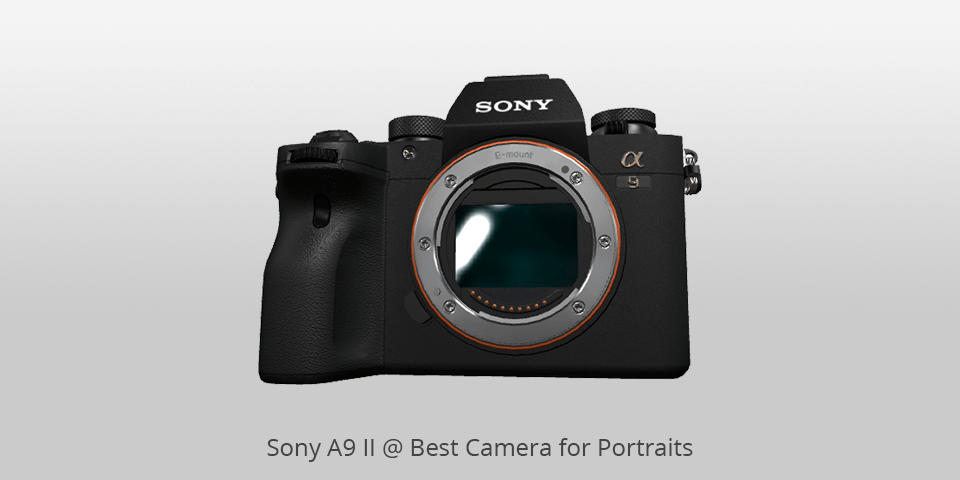
Body type: Mirrorless | Sensor: 24.2MP Full-Frame Exmor RS CMOS Sensor | Lens mount: E-Mount | Max resolution: 6000 x 4000
This full-frame mirrorless camera is among the best cameras for portrait photography which is an upgraded version of the best Sony model used by many portrait photographers. It has a new design with better weather-sealing. Its low-vibration shutter can withstand 500,000 shutter cycles. Besides, the camera has perfect in-body stabilization and extended connectivity options.
You can shoot photos at 10fps. This portrait camera has a mechanical shutter that makes it 2 times faster than the earlier version. The improved AF system supports Real-time AF tracking and updated autofocus algorithms. In addition, it has better battery capacity and allows you to use anti-flicker shooting mode.
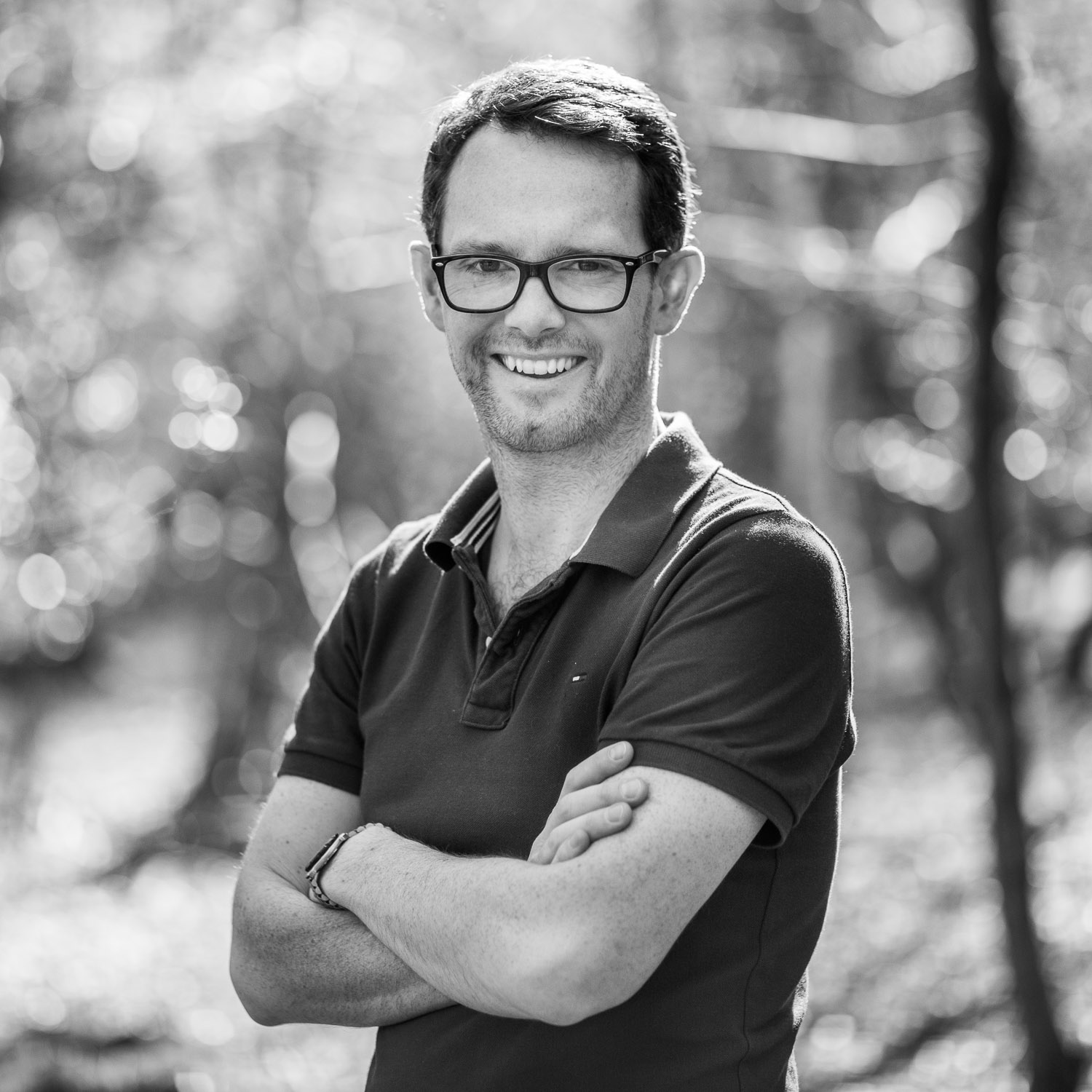
Photo taken with Sony A9 II
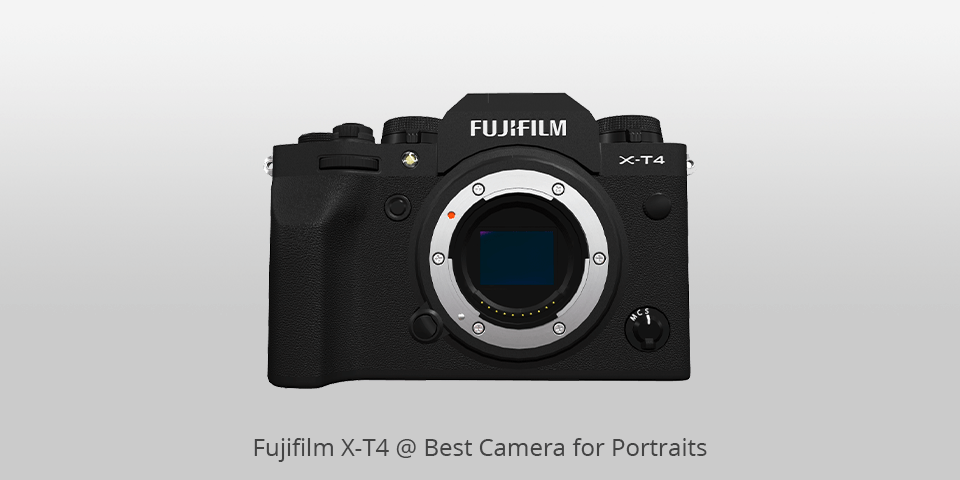
Body type: Mirrorless | Sensor: (APS-C) X-Trans CMOS 4 | Lens mount: FUJIFILM X mount | Max resolution: 6240 x 4160
This hybrid camera supports the newest technologies, which allow taking stunning portrait photos and shooting engaging video footage. It stands out among other APS-C cameras for portraits thanks to its speedy AF. Due to its mechanical shutter, you can take photos at up to 15fps, which lets you capture the best moments.
Even if you need to take photos in low-light situations, this Fujifilm camera will help you cope with this task quickly. It features 5-axis 6.5-stop IBIS and has a convenient grip for using it in handheld mode. In addition, it’s weather-resistant and securely protected against dust and moisture. You can use it at 14°F (-10°C). Since it has great battery life, this model is suitable for extended shooting sessions in extreme conditions.
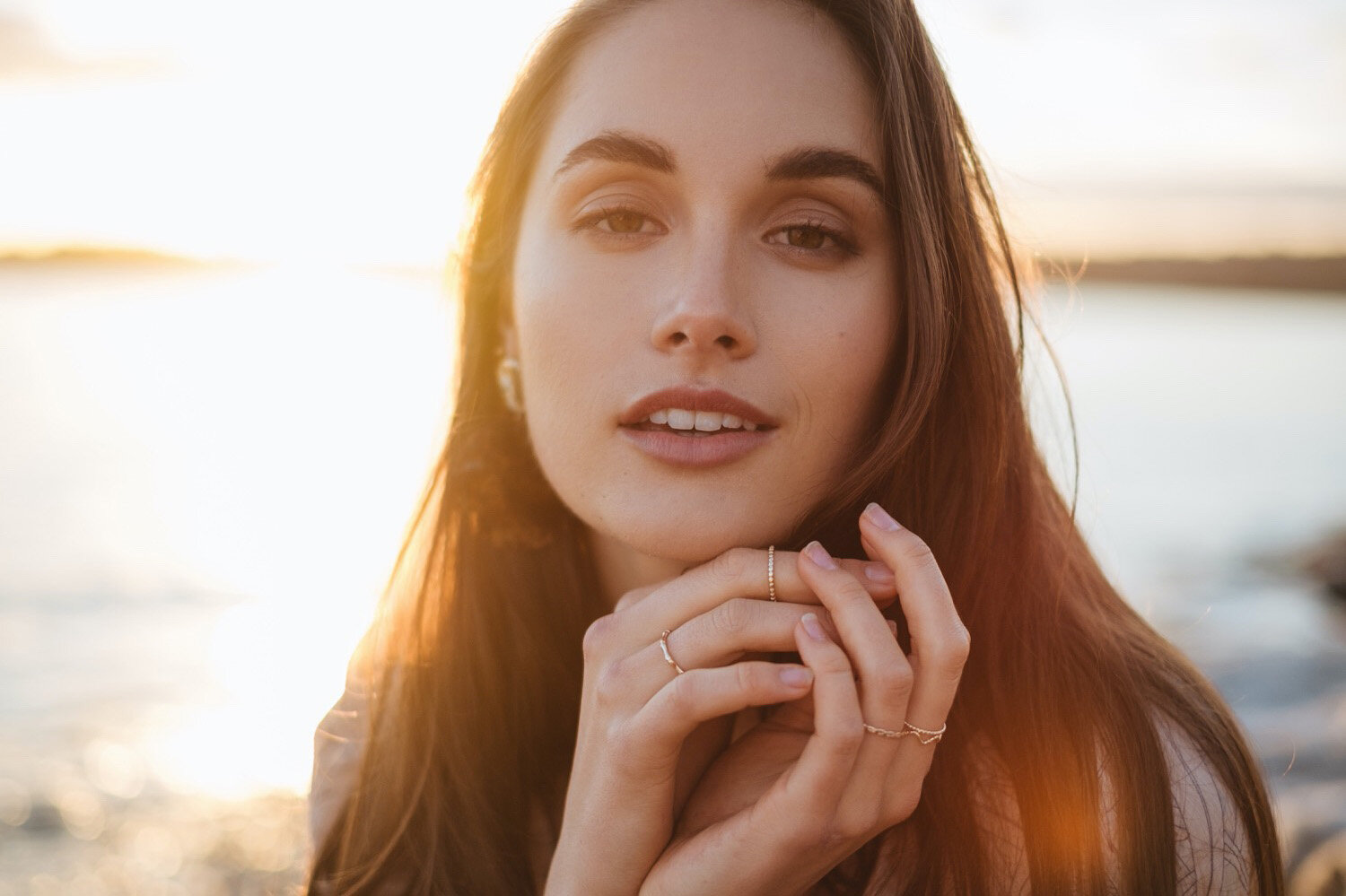
Photo taken with Fujifilm X-T4
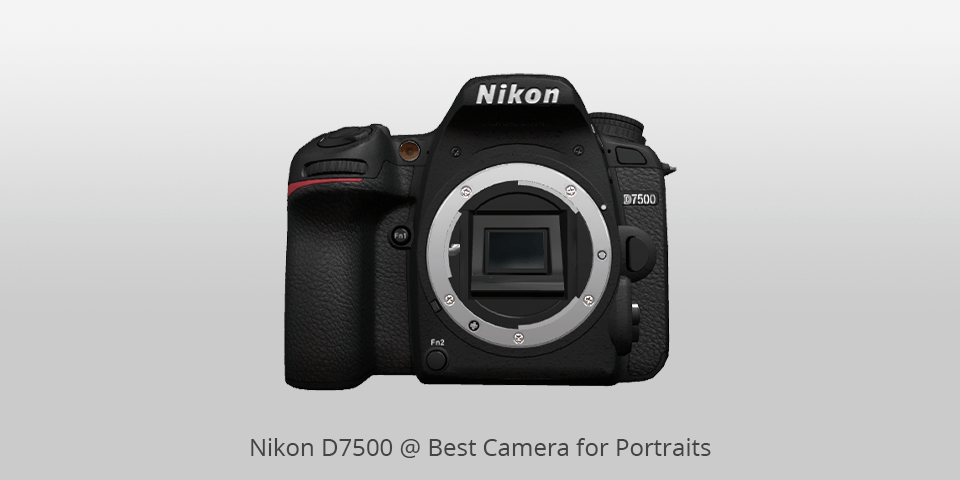
Body type: DSLR | Sensor: 20.9 MP DX-format sensor | Lens mount: Nikon F Mount | Max resolution: 5568 x 3712
While the D7500 might seem a bit outdated, this is a decent camera for portraits that is especially suitable for those who are looking for an affordable option. This is a highly-sought model that will be perfect for self-portrait photographers. Its key advantage is the 20.9MP sensor paired with an image processing engine. You can use this camera to shoot photos in burst shooting mode at 8fps.
The D7500 captures crisp images with perfect tones. You can use it to take self-portrait photos at concerts, parties, and other low-light events. This model is one of the best DSLR cameras in this price range.

Photo taken with Nikon D7500
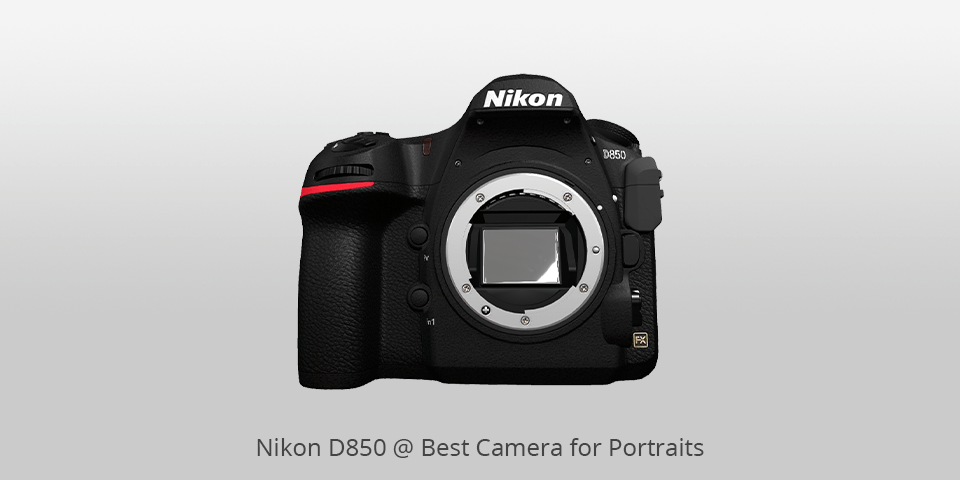
Body type: DSLR | Sensor: 6MP full-frame CMOS sensor | Lens mount: F Mount | Max resolution: 8256 x 5504
The Nikon D850 is a professional DSLR camera with speedy image processing that allows you to shoot pictures at 7-9fps. This model enables you to capture high-quality photos thanks to its fast upgraded shutter. This portrait camera supports Wi-Fi and Bluetooth connections, which allows you to quickly copy your photos and videos to your laptop or mobile device for further editing.
Due to a powerful FX-format CMOS sensor with high light-gathering abilities, you can take professional-quality photos. This Nikon photography camera is in high demand among experienced portrait photographers thanks to its convenient continuous shooting mode and high-precision autofocus.
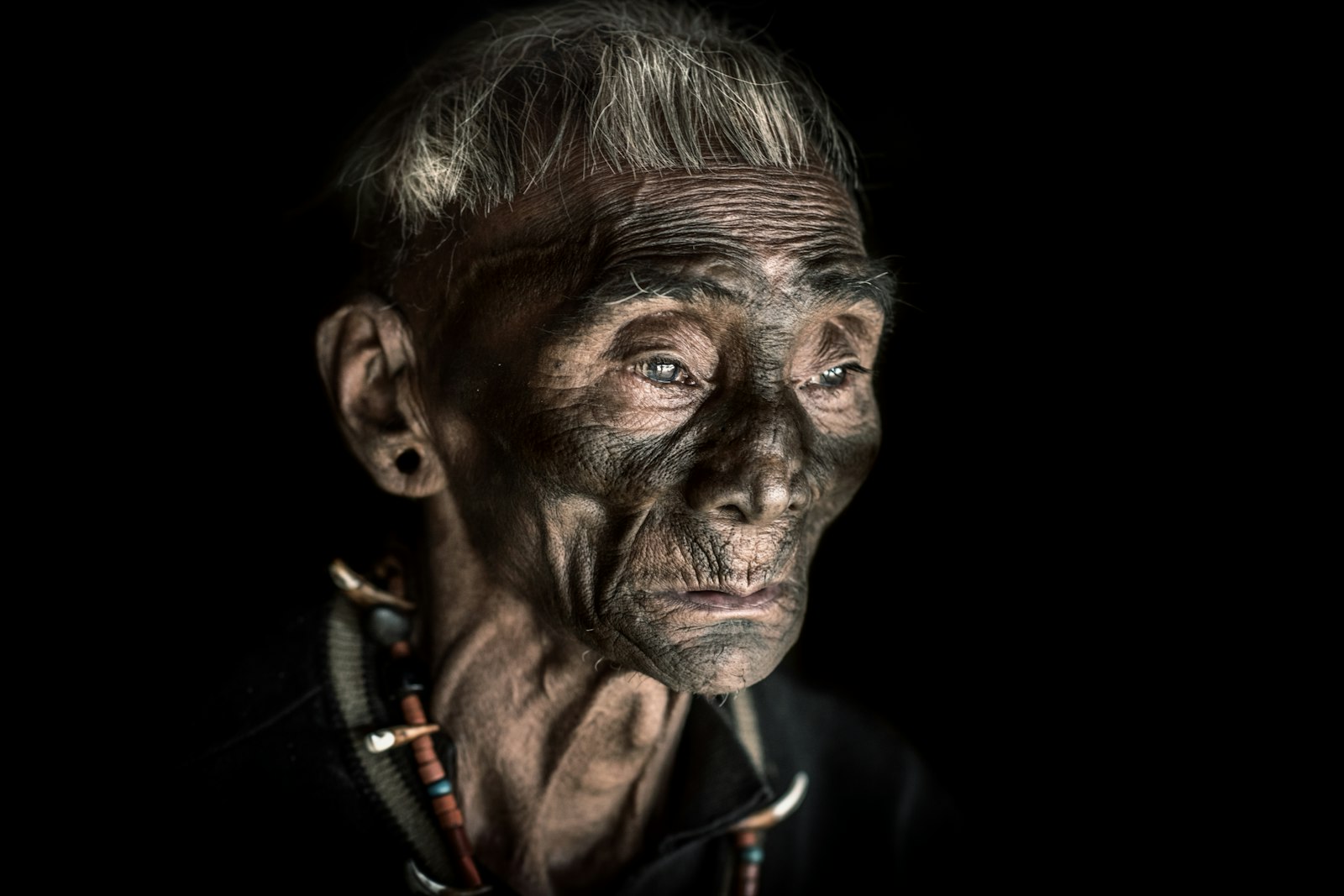
Photo taken with Nikon D850
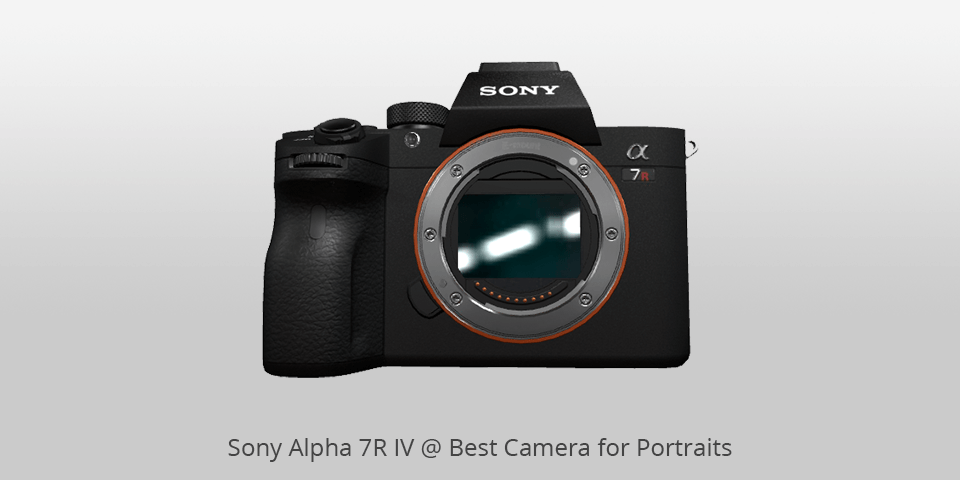
Body type: Mirrorless | Sensor: 61MP full-frame back-illuminated Exmor R sensor | Lens mount: E-Mount | Max resolution: 7008 x 4672
The Sony A7R Mark IV features a 61MP full-frame image sensor, which makes it one of the best camera for portrait photography. It is used by professionals who need to take high-res pictures. Thanks to its high-end sensor, you can use it to take landscape pictures, portraits, and photos in other genres. It enables you to capture pictures with a high level of detail.
Among other advantages of this camera, photographers often name full-resolution burst shooting, impressive high ISO performance, quick autofocus with impressive coverage across the entire sensor, real-time EYE AF tracking, and 4Kp30 video. In addition, this model has an advanced image stabilization system, which allows taking clear photos.

Photo taken with Sony Alpha 7R IV
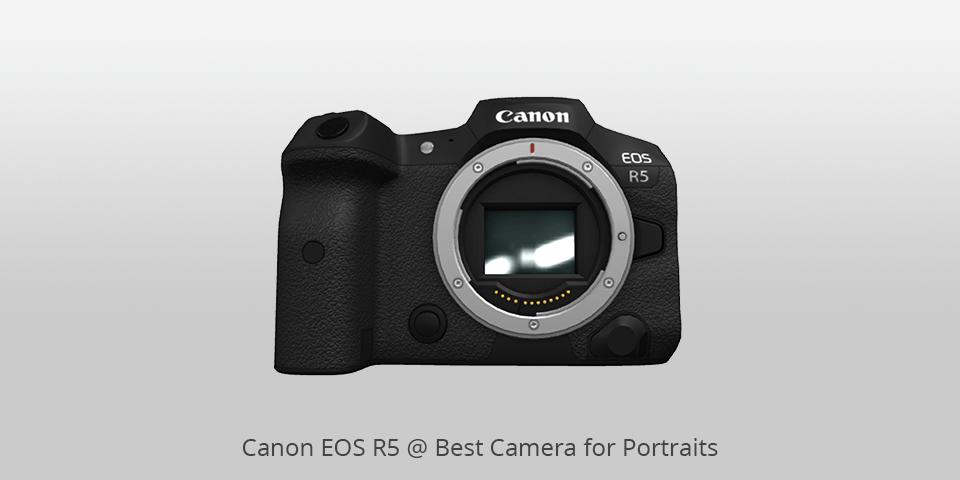
Body type: Mirrorless | Sensor: CMOS full frame (36 x 24 mm) | Lens mount: Canon RF mount | Max resolution: 8192 x 5464
The EOS R5 is among the best cameras for portraits, as it allows for easy adjustment of camera settings without relying solely on buttons, making it more ergonomic and user-friendly. Additionally, the camera offers built-in Wi-Fi and Bluetooth connectivity, which allows for seamless connection to mobile devices or computers. The USB-C port is also handy for powering external accessories.
Another major advantage of this Canon camera for portraits is its buffer capacity and fast focus system, making it one of the most advanced cameras for sports, events, and wildlife photography. It can shoot bursts at up to 20 frames per second with the electronic shutter or 12 frames per second with the mechanical shutter.

Photo taken with Canon EOS R5
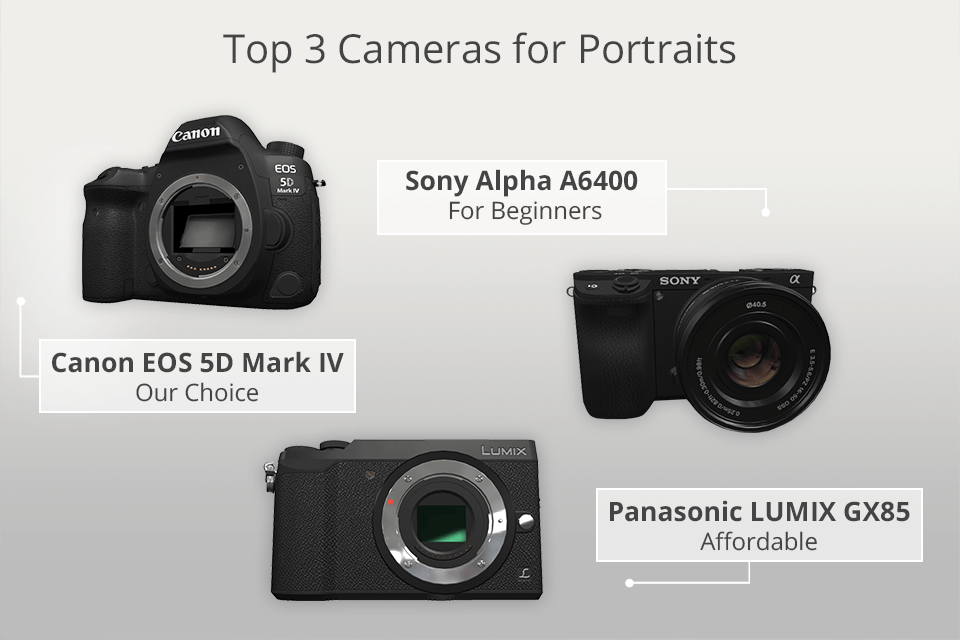
If you want to purchase the best camera for portraits, you need to consider several important things to select a model suitable for your budget and needs.
Megapixel count – 20MP. For portrait photographers, it’s crucial to use a camera that supports high resolution and allows taking clear photos. To take professional-looking pictures, you need to adjust the camera settings so that all the details are clearly visible in the frame. However, cameras with a decent megapixel count might be a tad too expensive for users who are on a budget. This is why you need to select a suitable lens.
Experienced photographers prefer 20MP cameras, however, even 12MP models allow taking high-quality photos with a size perfectly suitable for printing.

Comfortable ergonomics. Since it might be difficult to check ergonomics when buying camera online, seasoned professionals often visit retail stores to see if a camera fits comfortably in their hands. If you need to take photos for several hours, pick a lightweight model that you can take with you anywhere.
The best camera for portraits should have a set of necessary features and have an easy-to-navigate menu. This way, you will easily master its controls even without any prior experience.
Portability. If you are interested in outdoor portrait photography, you might need to select a portable camera that is easy to carry around. A heavy DSLR is perfect for studio photographers who mount such cameras on a tripod, however, it’s hardly suitable for those who often go on trips.

Interchangeable lenses. Portrait photographers prefer using portrait cameras with interchangeable lenses since it allows them to experiment with different angles and focal lengths. If you have several professional lenses, you can take unique photos. Besides, such cameras are a must for those who specialize in other genres besides portraits.
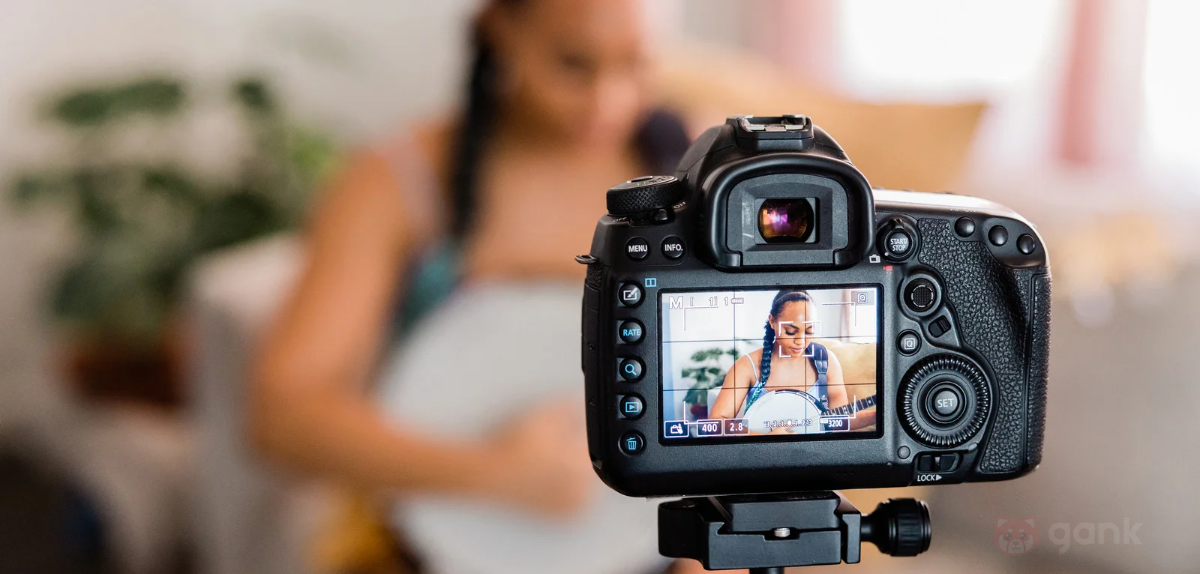
Manual modes. After mastering the main features of your portrait camera, start experimenting with manual mode and adjusting the settings depending on the light situation. To improve your photography skills, select a camera that allows you to adjust the exposure manually and has a lot of focus points, allowing to do all necessary camera settings for portraits.
Seasoned photographers believe that the best lenses for portraits have a focal length ranging from 70 to 135mm. In addition, they have the medium-sized max aperture, which allows taking photos in poor light situations with a shallow depth of field. If you take full-length or waist-level photos, you can also use 50mm lenses that are widely used by photographers who work at the studio or outdoors.
Set the aperture to f/2-f/4 when taking photos of one model. This way, the background will look slightly blurry. When taking group photos, it’s better to capture pictures at f/5.6-f/8. Those who use a camera in a handheld mode can set the shutter speed to 1/200th. If you have a tripod, set the speed to 1/15th. The speed should be even higher if you want to take good photos of kids. When adjusting the white balance, you can either use a preset suitable for your lighting situation or adjust the WB manually, depending on the weather and the time of the day.
It’s better to take the handgrip with your right hand and hold the camera body with the other hand. By keeping your elbows close to your torso, you can avoid muscle strain. Place one foot slightly ahead to take a more comfortable position. It will help you keep your balance.
To take professional portraits, it’s better to use Manual mode. You can select AF mode and use the back button focus to take pictures using one focal point.